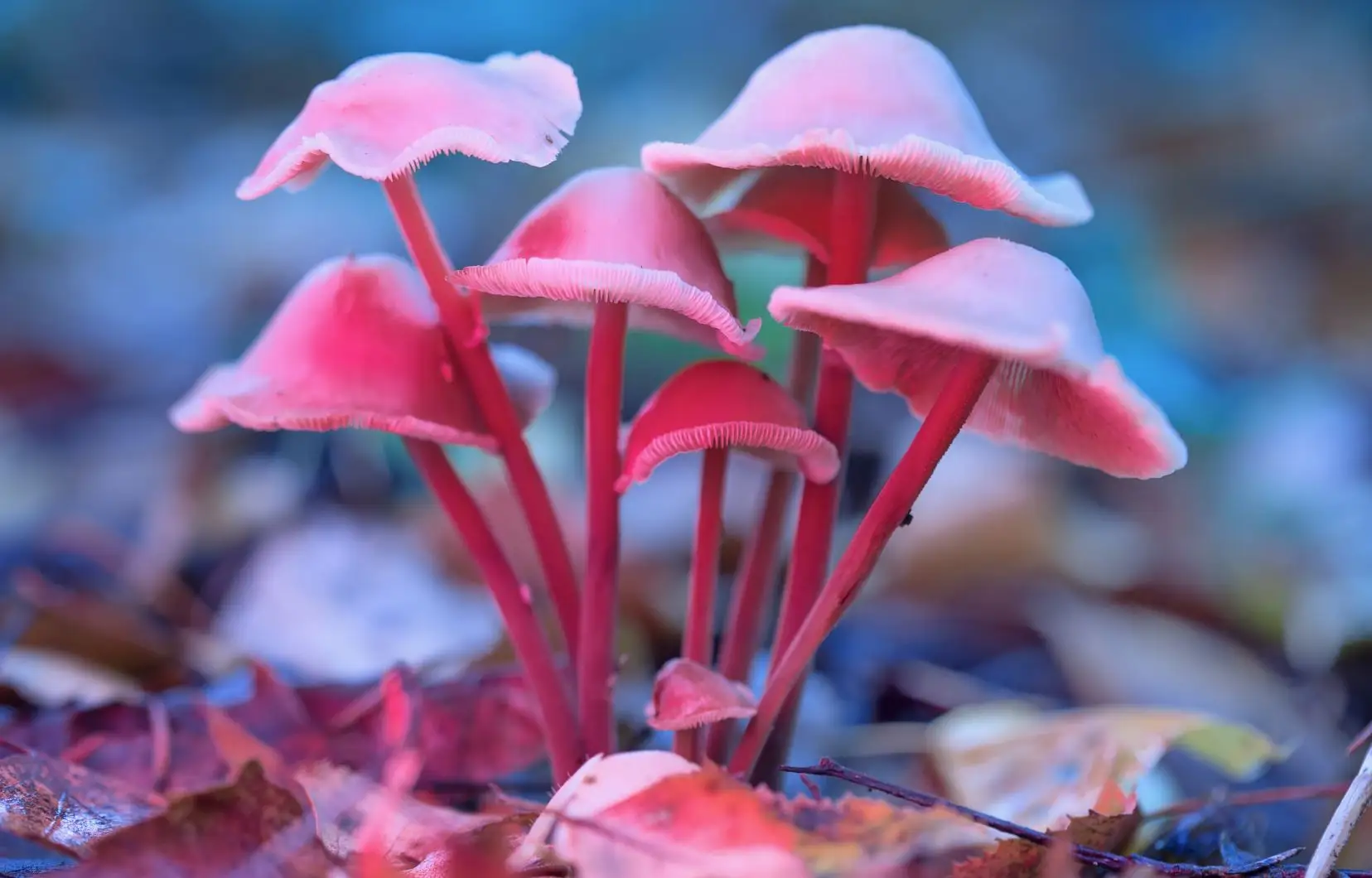For the past two or three years, I have been witnessing from close by the “shroom boom”, the renaissance of psychedelic mushrooms, better known in the medical or psychiatric world under the name of psilocybin, its active substance. Acquaintances, colleagues and friends of all ages, from 18 to 70 years old, administer micro or macro doses of “mush” to calm their anxiety, overcome their depression, their melancholy or their post-traumatic stress, when it is not to propel their creativity or their productivity. The entire UDA directory is microdosing right now,” jokes a close friend. It’s become the coke of the 2020s!”
Where cannabis and alcohol have failed, where antidepressants have been no more effective than a placebo (depending on the study, for mild to moderate depressive states), psychedelics have taken over for some.
Prescribed by Dr. Web to curious volunteers, the ancestral medicine tested on generations of followers was used by the natives millennia before Prozac or Paxil. Psychiatry was already increasing clinical studies in the 1950s – with some success – but was abruptly stopped in its tracks by President Nixon in 1970. The festival of cosmic brotherhood and kaleidoscope visions was over. Fight the Vietnam War, not love. The dissolution of the ego is for another time.
While psilocybin is allowed in Canada for assisted therapy as of this year (it was cancelled under Harper), the setting in which people try psilocybin is much broader and can even help, according to some studies, to eliminate alcohol and cigarette addiction. It sounds too good to be true.
“If you’re writing about this in your column, you’ve already done it,” a 30-something friend remarked to me with a smirk. Indeed, but for literary research purposes only and under medical supervision with two doctors, a shaman and a midwife, all of whom were vaccinated.
Reading a recipe for plum jam and tasting my plum jam is a totally different experience. Some sensations are difficult to put into words, like the feeling of being “one” with the universe.
Not at all secret societies
On September 22, the Psychedelic Society of Montreal organized a day of conferences on psilocybin. Etienne Billard, its director, is a postdoctoral researcher in pharmacology at McGill University. He is interested in the effects of psychedelics (including LSD) on neurons: “We want psilocybin to be legal and accessible, and for users not to be criminals and to be educated about it. There is no addiction associated with LSD and psilocybin.”
The 32-year-old scientist has been interested in drugs since he was 12 years old and has made it his field of research. “There has been a resurgence of scientific research in this area for anxiety and depression for about 20 years. On the other hand, there is no proven effectiveness for microdosing. There is certainly a fashion effect at present. More research is needed. Pharmaceutical companies are already on the case. It’s a race for a patentable synthetic compound without the hallucinogenic effect. For us, it’s important that psilocybin not be a model that remains solely in the hands of psychiatrists.”
To comment on the spot and define in words a moving situation or a complex cenesthetic state is to get in the way of what you are feeling. It is to move away from it.
- Henri Michaux, poet, "La psilocybine", 1960
Without a family doctor, Marc, a 29-year-old young professional, tried to treat a self-diagnosed moderate depression during the pandemic with psychedelics. He tried psilocybin in microdoses and twice in macro doses for a few months. He preferred LSD to psilocybin. “Mush is more internal, it increases introspection,” he notes. I was more aware of people, of my environment. It helped me become aware of things, but it doesn’t do the job for you.” Marc had read the book Journey to the Edge of the Mind, by journalist Michael Pollan, and watched the documentary Fantastic Fungi on Netflix. “These experiences with psychedelics gave me a new perception of the world, I learned about myself. It makes you grow as a person. It’s not addictive, but when I was microdosing, I was taking it every three days and I couldn’t wait to get back to that more perceptive state…” He’s had no trouble quitting since.
A normal revolution
For medical anthropologist Jessica Cadoch, this revolution expected by many users is not a surprise. The 28-year-old Montrealer studied at McGill University and has been based in Denver, U.S.A., for the past two years as an ethics consultant for companies promoting the therapeutic use of psychedelics. According to her, legislation is slowly shifting towards legalization, she tells me in a video conference from Colorado.
“Several cities have decriminalized psilocybin use in the U.S., like Denver, Washington, Seattle, and the state of Oregon has even legalized it for therapeutic use. We won’t be in the same place in 15 years, it will be a different mindset.”
On the other hand, Jessica is wary of what Big Pharma will do with it. “You can’t patent psilocybin. It’s a potential market, and we’re in a capitalist market. Communities need to organize so there’s not just one model. Psilocybin is not like alcohol: there is no lethal dose. The “set and settings”, the mental state and environment in which you take it, are important. If you have a history of psychosis, you have to be careful. It can happen. But there are also risks to climbing or taking medication.”
I learned more about the brain and its capabilities in the five hours after taking the mushroom than I did in my 15 years of study and research
- Timothy Leary, Harvard psychologist, 1965The medical anthropologist sees a promising avenue in these influenced therapies, which sometimes heal people in a single session: “We all suffer. We all need help. Our current mental health system is not working as well as it should. Antidepressants that you have to take for life only offer Band-Aid.”
Is the psychedelic threat medical or more cultural, political and economic? That may be the question.
Helpful hint: Consult a doctor before administering illegal substances and self-diagnosing mental illness. Namaste.
cherejoblo@ledevoir.com
Joblog | Fantastic Mushrooms
Baudelaire said that “in order to digest natural happiness, as well as the artificial, one must first have the courage to swallow it”. Much of the Fantastic Fungi documentary is devoted to psilocybin therapies, particularly those used at Johns Hopkins University. Courageous (or desperate) patients tell of their accompanied experience. A number of psychiatrists, psychologists and neurological researchers comment on the use of these medicines and their troubled history during President Nixon’s war on drugs.
Cancer patients are losing their fear of dying altogether. But as journalist Michael Pollan points out, a treatment that is only taken once or twice is not a good business model for the pharmaceutical industry. A visually successful film that can be watched well before the miniseries Journey to the Edge of the Mind (based on Michael Pollan’s book), where the second episode is devoted to psilocybin. Pollan co-founded the Center for Psychedelic Science at UC Berkeley after the release of his best-selling book How to Change Your Mind, in which he experiments with each of the psychedelics and explains their benefits and effects with the help of experts in the field.
On Netflix:
Discovered this text by the poet Henri Michaux on La psilocybine (experiments and self-criticism). He relates two sessions made at the end of the 1950s with Mexican mushrooms, one at the hospital, under medical control, and the other at home. The famous poet lacks words, that’s all. https://bit.ly/3EQuSy4
Loved the series of six articles, an investigation of the newspaper Le Monde, published this summer, on magic mushrooms. Even if the articles repeat themselves a bit, they go through their history, their discovery by America and the therapeutic use rediscovered today. French comedian Blanche Gardin tells how psilocybin helped her out of a depression and how psychedelics developed her sense of humor. https://bit.ly/3CKHTqf
Listen to Dr. Marie-Ève Morin’s interview on the use of psychedelics in the treatment of certain mental illnesses on Deux hommes en or and Rosalie last January. Two words: open your mind. Major depression has become the leading cause of disability in the world. In her 20-year career, the addiction and mental health physician has never seen a case of LSD or psilocybin addiction. She also talks about microdosing. https://bit.ly/3EXNVqb
Source: https://www.ledevoir.com/opinion/chroniques/766103/chronique-la-saison-des-champignons
 English
English
 Français
Français

Your article helped me a lot, is there any more related content? Thanks!
Thank you for your sharing. I am worried that I lack creative ideas. It is your article that makes me full of hope. Thank you. But, I have a question, can you help me?